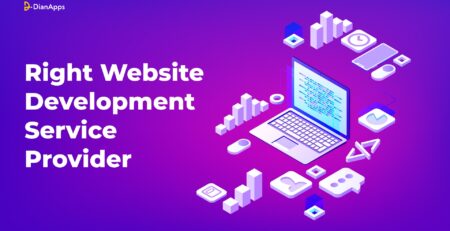What is the Role of DevOps in Web Development Services?
The internet is more than just a vast expanse; it’s a boundless universe offering millions of websites and applications with endless possibilities. To craft this extensive content and software, web developers need to collaborate seamlessly and swiftly, responding adeptly to any necessary modifications while continuously building and maintaining their products.
Web developers try to use various methodologies to create top-notch products. One such method ensures efficiency not only during the initial stages of building and designing sites but also throughout the ongoing process of maintenance and continuous updates. As soon as the process of software development is finished, the web development experts are responsible for the enhancements and updates to be made.
But what does it have to do with the DevOps implementation? Well, there’s a great rule of DevOps in web app development.
To know more in detail, this blog post will provide valuable insights into the power of DevOps in web development services.
So let’s get started!
What is DevOps in Web Development?
DevOps – a fusion created by merging two segments: software development (Dev) and IT operations (Ops). This concept advises for a streamlined and collaborative approach in the entire software development lifecycle. It’s not just a methodology or toolset, but rather an approach that aims to unite the development and operations teams for quicker and reliable application delivery.
According to a recent survey of IT organizations that implemented DevOps showed major improvements, including 60X fewer failures, 30X more deployments, and 200X shorter lead times. These improvements also led to higher code quality and overall organizational culture.
Organizations that integrate DevOps foster enhanced team communication, collaboration, and cooperation. This approach enables swift prototyping, development, testing, and deployment of top-notch software applications and updates, resulting in an improved end-user experience and heightened satisfaction.
Talking about web development, DevOps focuses on continuous integration, continuous delivery, and ongoing improvement, leveraging a combination of robust practices, principles, and tools to ensure the efficient delivery of web applications.
DevOps Implementation Statistics:

- The global market for CI tools was worth about $970.52 million in 2022. Experts predict it will reach around $4,377.77 million by 2031, growing steadily each year.
- Google’s research shows that a whopping 77% of organizations already use or plan to use DevOps for software deployment.
- Businesses using DevOps can save up to 60% of their time spent on support cases, allowing them to focus more on improving their infrastructure.
- This trend is expected to continue, with the DevOps market projected to grow to $25.5 billion by 2028.
- Additionally, about 22% of businesses with top-notch security measures have fully embraced DevOps practices.
What is the role of DevOps in web development?
1. Continuous Integration And Continuous Deployment (CI/CD)
CI/CD practices are at the heart of DevOps. These practices enable developers to integrate their code changes more frequently and reliably and ensure that the code is always in a deployable state. Moreover, this leads to faster detection and rectification of bugs and quicker deployment of new features.
2. Automated Testing
It encourages using automated testing tools, allowing efficient and effective code testing. Automated tests run quickly, can be run frequently, and provide immediate feedback to developers about the health of their code.
3. Infrastructure As Code (IAC)
It introduces the concept of IaC, which allows developers to manage and provision the technology stack for an application through software rather than manual processes. This enables consistent and repeatable processes, reducing the chance of human error.
4. Collaboration And Communication
Moreover, DevOps promotes a culture of increased communication and collaboration. This leads to a more efficient development process.
5. Monitoring And Logging
Additionally, DevOps encourages using tools for monitoring application performance and logging errors. This lets teams quickly identify and resolve issues, improving website performance and uptime.
6. Faster Recovery Times
If something goes wrong, the tight integration of development and operations teams means the issue can be detected and fixed more quickly. Additionally, this leads to faster recovery times and less downtime.
What are the Benefits of DevOps in Web Development?

- Faster Development: DevOps speeds up the entire development process by automating tasks, reducing the time it takes to bring a product to market.
- Cost Savings: By automating tasks, DevOps helps companies save on costs that would otherwise be spent on additional personnel.
- Improved Quality: DevOps continuously tests applications to minimize errors, ensuring higher-quality releases.
- Enhanced Collaboration: DevOps fosters collaboration between different departments, ensuring everyone understands the software development cycle.
- Scalability and Flexibility: DevOps leverages cloud infrastructure to scale applications efficiently, allowing them to handle varying workloads.
- Innovation and Adaptability: DevOps promotes experimentation and rapid iteration, fostering a culture of innovation and adaptability.
- Enhanced Security: DevOps integrates security throughout the development process, ensuring automated security checks and quick responses to threats.
How to Implement DevOps in Web Development?
1. Keeping Track of Changes:
In web development, using tools like Git helps teams manage code changes effectively. Git lets developers collaborate, track changes, and maintain code integrity.
2. Streamlining the Process:
CI/CD tools like Jenkins and Travis CI automate the build, testing, and deployment phases. This ensures that code changes are quickly integrated and deployed, resulting in high-quality software releases.
3. Simplifying Deployment:
Containerization tools like Docker simplify application deployment by packaging them with their dependencies. This ensures consistent performance across different environments, making deployment more flexible and efficient.
4. Popular Real-world examples of DevOps implementation
Implementing DevOps in web app development projects has gained popularity for many years now. Various companies acknowledge the benefits of using DevOps practices to streamline their processes and deliver top-notch products in less time than ever.
To support the above statement, we have listed below some of the popular brands that have implemented DevOps in web development services.
5. Netflix
Netflix is a well-known example of a company that has successfully executed DevOps as a practice. Their DevOps culture has accelerated innovation, leading to multiple business advantages. In addition, it helped them achieve near-perfect uptime, push new features faster to the users, and increase their subscribers and streaming hours.
6. Etsy
Etsy is an online marketplace that has also implemented DevOps practices in its web development process. By using tools like Chef and Jenkins, Etsy has been able to automate many of its development processes. Thus, it has led to faster release cycles and improved collaboration between teams.
7. Amazon
With a range of adaptable services, Amazon intends to assist businesses in using DevOps with AWS to build and deliver products in a faster and more reliable way.
Top DevOps Trends to Watch For in 2024:

GitOps:
GitOps streamlines custom software development and deployment using tools like Kubernetes and Git. It simplifies the process by managing both application code and infrastructure through Git, alongside CI/CD pipelines.
Serverless Architecture:
Serverless computing continues to rise, allowing businesses to focus on application improvement without managing infrastructure. Applications are built to function without server management, offering agility and efficiency.
AIOps/MLOps:
AIOps/MLOps, powered by AI and ML, automates IT operations by monitoring, managing, and analyzing data in real time. This automation enhances precision and eliminates manual processes.
DevSecOps:
Security remains a top concern, leading to the integration of security early in the development process through DevSecOps. This approach prioritizes security from the start, reducing the risk of vulnerabilities.
Microservice Architecture:
Microservices, small components rolled out independently, have become the standard in software development. They offer agility, efficiency, and scalability, enhancing reliability and security.
Low-code Applications:
Low-code applications are gaining popularity, allowing organizations to streamline development processes and run applications more efficiently. They leverage staff’s technical skills and simplify software development.
Containerization:
Containers, an integral part of DevOps, have evolved to simplify application development and deployment. They provide performance similar to virtual machines but are easier to manage and deploy.
How can DianApps help in implementing DevOps principles to your business success?
Using DevOps may significantly speed up software releases while also ensuring that applications meet quality objectives. However, DevOps cannot be bought, added on to, or merely declared. It can rather be implemented or migrated.
By implementing DevOps best practices and methodologies, DianApps, a top-notch provider of DevOps Consulting services enables businesses to enhance the agility and efficacy of their development operations.
Our DevOps engineers use cutting-edge tools and technology to enhance our frameworks and incorporate DevOps practices into the operations of your business.
Some platforms and tools for DevOps solutions implementation.
- TeamCity for Automation;
- Ansible for Configuration Management;
- Docker and OpenStack for Compute Virtualization
Therefore, to speed up the release of your product, we automate business processes and cloud infrastructure while maintaining continuous integration and delivery.
Being a leading DevOps consulting service provider in the USA and Australia, we offer custom DevOps services. For instance, consulting, continuous delivery and deployment, continuous integration, and continuous monitoring. We have assisted clients like DChange and PagarKhata to help them gain a competitive edge in their respective industries.
Get in touch with our professionals instantly if you require assistance with similar services!
Read this out to know more about top 10 web development businesses in the US that can aid the business in 2023
Final Words:
In summary, DevOps plays a crucial role in modern web development, enhancing speed, reliability, and efficiency through automated processes and improved collaboration. The benefits include fewer errors and an enhanced user experience. To fully unlock these advantages, selecting the right DevOps consulting services is vital.
For a dependable and experienced DevOps consulting partner, consider reaching out to DianApps. Our technical expertise, commitment to excellence, and timely delivery can elevate your web development efforts. Contact us today to explore how we can help you achieve your business goals and stay competitive. Check out our detailed article to clarify all your concerns regarding why choose DianApps as your website development partner.




